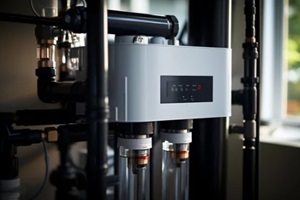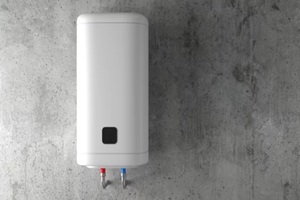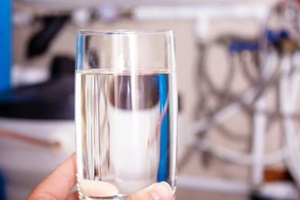 Most water contains trace amounts of dissolved metals, especially calcium and magnesium. Ideally, the calcium and magnesium levels should be between 3.5-7 grains per gallon, and water is classified as “hard” if it exceeds that.
Most water contains trace amounts of dissolved metals, especially calcium and magnesium. Ideally, the calcium and magnesium levels should be between 3.5-7 grains per gallon, and water is classified as “hard” if it exceeds that.
Hard water doesn’t impact your overall health, but it has an unpleasant taste and smell that many people find bothersome. More importantly, hard water creates limescale deposits that can damage appliances and cause other significant issues.
Consequently, the Department of Energy recommends installing water-softening systems to avoid these problems. Find out how a residential water softener can protect your home and save money.
Water Softening Systems Protect Your Plumbing
Dissolved metals remain in pipes long after the water stops flowing, eventually forming limescale deposits. These deposits take up space inside the pipes, causing a reduction in water flow.
Unfortunately, the plumbing system continues to apply the same amount of pressure to move the water through the pipes, which can cause leaks and additional damage. If this happens, you’ll have to repair or replace pipes throughout your home.
If you have an older house, you may also have to deal with additional problems. Plumbing systems in older homes contain metals susceptible to corrosion when exposed to hard water.
The corrosion can damage the entire plumbing system, meaning you may have to get your home replumbed.
You can remove the limescale deposits and prevent further deposits from forming by installing a water-softening system. Softer water dissolves the deposits and flushes them out of the plumbing system.
This is a gradual process, but you’ll notice an improvement over time. Since softer water doesn’t repair the damage immediately, installing a new system before suffering significant damage is wise.
Protect The Quality Of Your Hot Water Heater
Limescale deposits also form inside hot water heaters when homes use hard water. The deposits further insulate the water heater, impeding heat transfer. Clogs and damaged components are also possible when a household uses hard water.
 Your water heater also works much harder when using hard water. According to the EPA, hot water heaters with small limestone deposits are up to 12% less efficient. If the deposits get bigger, water heaters can be up to 50% less efficient.
Your water heater also works much harder when using hard water. According to the EPA, hot water heaters with small limestone deposits are up to 12% less efficient. If the deposits get bigger, water heaters can be up to 50% less efficient.
On average, Hawaii residents have higher energy bills than people living in any other state, and the amount increases when water heaters aren’t efficient. Water softening systems help Hawaii residents maintain efficient systems to avoid higher-than-normal energy costs.
Water Softening Systems Extend the Life of Washing Machines and Dishwashers
Washing machines and dishwashers require large amounts of water, creating a prime opportunity for limescale to build up when using hard water. The buildup can cause machine breakdowns, reduced efficiency, and a shorter lifespan for both appliances.
Hard water also doesn’t clean clothing or dishes as effectively as softer water. Detergent and soap don’t lather very well when mixed with hard water and leave residue behind that sticks to clothes and dishes.
From dingy whites to streaks on dishes, the effects of hard water are noticeable. Switching to a water-softening system will provide cleaner clothes and dishes. You’ll also use less soap and detergent when cleaning with softer water, allowing you to cut down on cleaning supply costs.
Protect Other Appliances
Major appliances aren’t the only household items at risk when using hard water. All appliances that require water can suffer the same type of damage from limescale deposits.
These include coffee pots, icemakers, slow cookers, and garden hoses. These household items may not be overly expensive, but the cost increases when you replace them regularly.
Look and Feel Cleaner With Softer Water
Since soap isn’t as effective when mixed with hard water, you won’t get as clean as you should when showering and bathing. Hair feels rough and easily tangles when cleaned with hard water, and the dissolved metals dry out the skin, too.
 More concerning, you can end up with hard water deposits on your skin at the end of your shower, making you feel anything but clean.
More concerning, you can end up with hard water deposits on your skin at the end of your shower, making you feel anything but clean.
People notice a significant difference after installing water-softening systems. Besides getting cleaner, people report feeling better after bathing or showering in softer water.
Get a Quote for a Water Softening System
You can reduce the damage caused by hard water by installing a residential water softening system. This system softens the water before it moves through the pipes and reaches your hot water heater, shower, and other appliances.
Contact Hawaiian Cool Water to learn about systems from Pentair, Elkay, and other leading brands. After discussing your options, you can get a quote and move forward with the installation.


